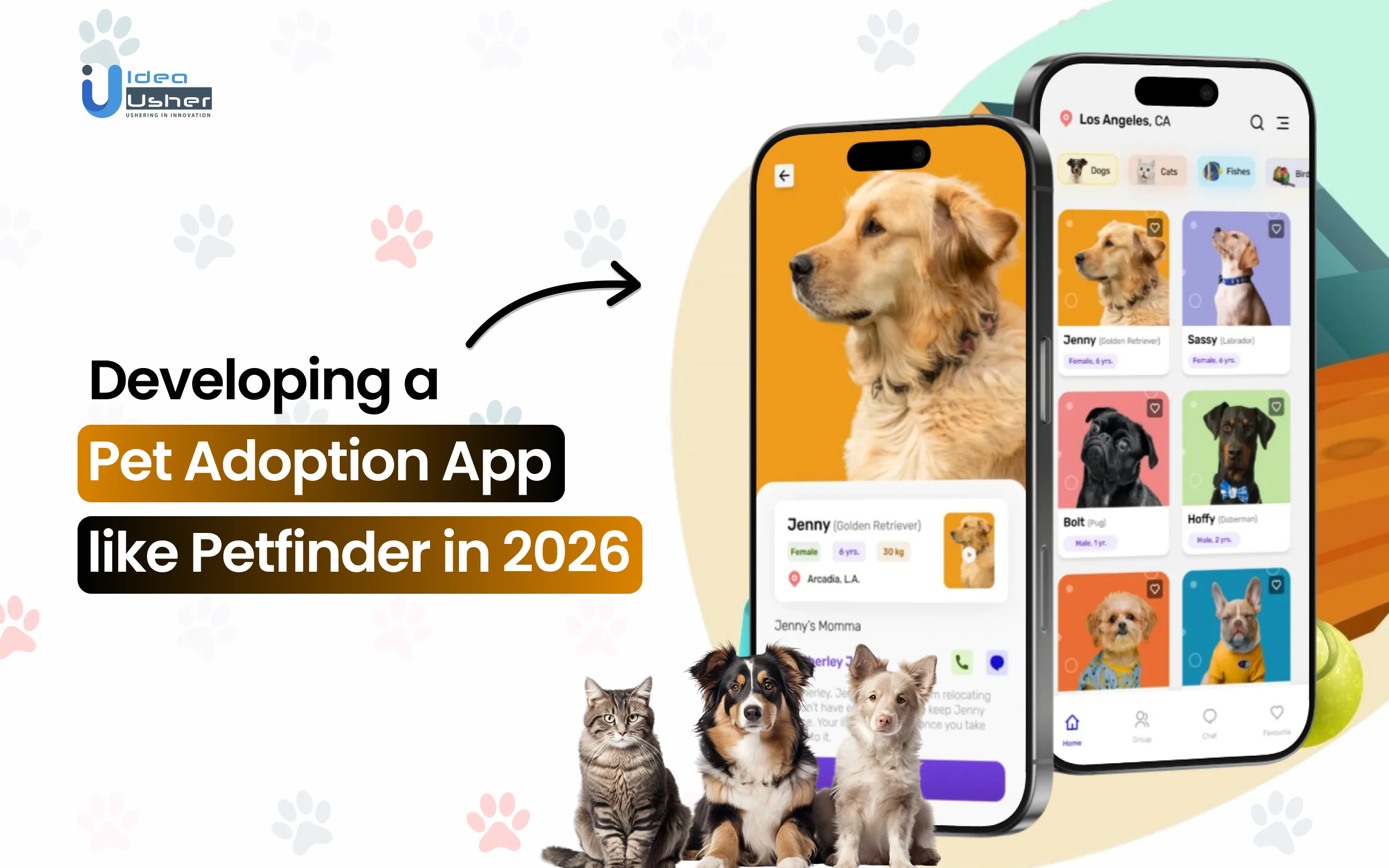The bond between animals and humans is undeniable, and the pet adoption industry reflects this deep connection. However, finding the perfect furry or feathery friend can be a challenging process for both potential adopters and shelters or rescues. This is where pet adoption apps can be very helpful!
For instance, Petfinder, a household name in the pet adoption sector, recently announced a surge in app downloads, highlighting the growing popularity of mobile solutions for pet adoption. Their user-friendly interface and features like searchable pet profiles, shelter/rescue listings, and direct messaging have streamlined the adoption process for millions.
But with the pet care industry constantly evolving, there’s always room for innovation. For pet care companies looking to capitalize on this growing market, developing a pet adoption app in 2025 presents a unique opportunity to address current limitations and create a more efficient and impactful user experience.
In this blog, we are going to discuss everything you need to know to develop a unique pet adoption app like Petfinder from scratch. So stay with us till the end!
What is the Petfinder App?
Petfinder is a prominent player in the pet adoption app market, providing a valuable resource for both aspiring pet owners and animal shelters. The app serves as a searchable database of adoptable animals from shelters across North America. Users can browse detailed profiles of dogs, cats, rabbits, birds, and other animals, complete with photos, descriptions, and temperament assessments. This comprehensive search function empowers potential adopters to find pets that best suit their lifestyle and living situation.
Petfinder has over 2 million monthly active users who search a database of adoptable pets from shelters and rescues across North America. And with this large user base, Petfinder has also reported a success rate of over 600,000 pet adoptions facilitated through its app each year.
The Business Model of the Petfinder App
Petfinder operates on a freemium business model, prioritizing successful adoptions over direct revenue generation from pet owners. This approach fosters trust and incentivizes shelters and rescues to utilize their platform. Shelters can list adoptable pets for free, creating detailed profiles with photos, descriptions, and contact information.
While there are no adoption fees associated with the app itself, Petfinder does offer premium services for shelters. These premium services, often tiered by subscription plans, can include advanced search tools like breed filters and life stage preferences, data analytics on pet views and inquiries to optimize listings, and priority ad placement within the app for maximum exposure. These subscription plans typically range from around $25 to $100 per month, depending on the chosen features and shelter size.
Key Market Takeaways for Pet Adoption Apps
Source: Verified Market Reports
Leading apps like Petfinder and Adopt-a-Pet consistently top app store download charts, reflecting a consumer shift towards mobile technology for pet adoption. Beyond downloads, user engagement thrives with features like swipeable pet profiles and in-app messaging, creating an interactive experience that keeps users actively searching for their perfect match.
Beyond downloads, user engagement thrives with features like swipeable pet profiles and in-app messaging, creating an interactive experience that keeps users actively searching for their perfect match. For instance, a recent case study by the American Society for the Prevention of Cruelty to Animals highlighted how a local shelter partnered with a pet adoption app to host a virtual adoption event. The event led to a 25% increase in adoption inquiries in just one week, demonstrating the platforms’ ability to connect adopters and shelters in innovative ways.
Must-Have Features of a Pet Adoption App
More and more people are turning to apps to find their furry friends. But with so many options out there, how can your app stand out from the pack? The answer lies in creating an experience that’s as delightful for pet parents-to-be as it is for the shelters and rescue organizations your app supports.
Here’s a breakdown of some essential features that can set your app apart:
1. Streamlined User Registration
Allow users to register seamlessly with email or social media accounts, catering to a tech-savvy audience. Additionally, providing separate account types for adopters and shelters/rescue organizations ensures a tailored experience for each user group.
2. Compelling Pet Profiles
High-quality photos and videos are key to grabbing attention. Detailed profiles with information like name, age, breed, personality traits, and location provide adopters with a comprehensive understanding of each pet.
3. Advanced Search Functionality
Effective search filters are essential for users to refine their search based on preferences. Filters including breed, age, size, personality traits (e.g., playful, low-maintenance), and location can help users find pets that best suit their lifestyle and living conditions.
4. Intuitive Navigation
A clean and user-friendly design is paramount. Features like infinite scrolling and quick filters enable effortless browsing of countless adoptable pets.
5. Clear Adoption Information
Transparency is crucial for establishing trust with potential adopters. Clearly outlining adoption policies, application requirements, and follow-up support helps users understand the entire adoption process.
6. Engaging Notification System
Keep users informed and engaged through timely alerts. Notifications can inform them about new pet arrivals, updates on their adoption applications, and relevant news from shelters they follow within the app.
7. Direct Communication Tools
Streamline the adoption process by fostering seamless communication between users and shelters. In-app messaging allows adopters to ask questions, inquire about specific pets, and directly initiate the adoption process.
8. Social Sharing Integration
Encourage user engagement by allowing them to share adorable pet profiles and adoption success stories on social media platforms. This not only increases visibility for pets in need of homes but also promotes the app’s adoption services, potentially attracting new users.
Tech Stacks Required To Develop a Pet Adoption App
Developing a robust pet adoption app requires a strategic combination of tech stacks that cater to user experience, data management, and seamless integration with existing systems. Let’s explore the crucial tech stacks you should consider to create a successful pet care app.
1. Building User-friendly Interfaces
First, let’s start with the user interface, where potential adopters and animal shelters interact with the app. Use popular frameworks like React or Angular that can help make dynamic and interactive web applications. These technologies ensure a smooth user experience, keeping users engaged and facilitating the adoption process.
2. Powering the Backend Engine
The backend acts as the backbone of the app, handling data processing and executing complex calculations on the server side, ensuring smooth functionality for users. The choice of framework for backend development hinges on the project’s requirements and a team’s existing expertise. Popular options include Node.js, Django, and Ruby on Rails. These frameworks are valued for their scalability, allowing DeFi applications to handle growing user bases and increasing data volumes efficiently..
3. Data Storage and Management
The app thrives on data – animal profiles, user information, and adoption preferences. Selecting the right database solution is paramount. Popular options include PostgreSQL, MongoDB, or Firebase. Each offers distinct advantages. Choosing the most suitable solution depends on factors like the type of data being stored, scalability needs, and the desired data structure.
4. Enhancing Functionality through Integrations
To unlock the app’s full potential, integration with external services is crucial. REST APIs act as the bridge between the app’s front-end and backend, enabling smooth data exchange. Furthermore, integrating with third-party services like animal shelter databases, geolocation for finding nearby shelters, and secure payment gateways for adoption fees fosters a comprehensive user experience.
5. Scalability and Reliability in the Cloud
As the user base grows, the pet adoption app also needs to scale efficiently. Cloud platforms like AWS, Google Cloud Platform, or Microsoft Azure provide robust solutions for hosting and managing app resources. These platforms offer scalability, ensuring the app remains operational and accessible to a large user base. By adopting a cloud-based approach, companies can focus on core functionalities while the cloud provider handles infrastructure management.
How to Develop a Pet Adoption App?
Building a successful pet adoption app requires a multi-pronged approach that considers the needs of both potential adopters and shelters/rescue organizations. Here’s a roadmap for businesses to navigate the development process:
1. Market Research and User Needs Assessment
Conduct detailed market research to understand the pain points and preferences of both user groups. What features would make the adoption process smoother for potential pet owners? What functionalities would streamline shelter operations and increase adoption rates? By gathering user data through surveys and focus groups, businesses can identify core functionalities and prioritize features that will drive user engagement.
2. App Development and Core Functionalities
Next, choose between developing native apps for iOS and Android, which provide the best user experience but can be expensive, or using cost-effective cross-platform frameworks like React Native or Flutter. These frameworks allow the creation of a single codebase that functions on both platforms. Regardless of the platform chosen, the app’s user interface should be intuitive and prioritize clear search filters, high-quality pet pictures, and detailed descriptions with temperament information.
3. Building Trust and Transparency
Data security and user privacy are crucial for building trust. The app should incorporate secure user logins with multi-factor authentication and data encryption following industry best practices. Businesses should establish clear guidelines for shelters regarding pet information accuracy and implement robust vetting procedures for potential adopters.
4. Fostering a Community
Create a sense of community within the app through pet owner forums, success stories showcasing happy adoptions, and educational resources on responsible pet care. Businesses can partner with local pet stores and veterinary clinics to provide some exclusive discounts and promotions to app users, potentially through loyalty program integrations using APIs.
5. Monetization Strategy
Freemium models with premium features like advanced search filters or priority adoption requests can be explored. Alternatively, responsible in-app advertising partnerships with pet-related companies or sponsored pet profiles with clear disclosures can generate revenue streams.
Some Important APIs for Seamless Functionality
Beyond the core functionalities, integrating APIs unlocks a new level of sophistication for pet adoption apps. These APIs act as bridges between your app and valuable external services, creating a seamless and feature-rich user experience that can significantly benefit businesses.
1. Expanding Pet Selection with Shelter Integrations
APIs from established platforms like Petfinder or Adopt-a-Pet provide access to vast databases of adoptable pets across numerous shelters and organizations. By integrating these APIs, companies can populate their app with a wider selection of animals, catering to diverse user preferences. This not only increases the chances of successful adoptions but also strengthens relationships with shelters by expanding their reach to a wider audience.
2. Location-Based Services with Geolocation APIs
Integrating geolocation APIs like Google Maps allows companies to leverage the power of location-based services. This empowers users to discover nearby shelters and rescue organizations effortlessly. They can view shelter locations on a map, receive directions, and access localized content like adoption events and policies – all within the app. This convenience fosters a more efficient adoption process, ultimately leading to more animals finding loving homes.
3. Streamlined User Authentication and Social Sharing
Authentication APIs like Google Sign-In or Facebook Login offer secure and convenient user registration methods. These integrations eliminate the need for lengthy sign-up forms, improving user experience and encouraging app adoption. Furthermore, social APIs allow users to share pet profiles and adoption success stories with their social networks. This organic promotion broadens the app’s reach, attracts potential users, and fosters a sense of community around pet adoption.
4. Secure Payment Processing through Payment Gateways
Integrating payment gateway APIs such as Stripe or Braintree empowers companies to facilitate donations, adoption fees, and potentially even premium features within the app. Secure and seamless payment processing is also crucial for building user trust and confidence. By ensuring a smooth and reliable payment experience, companies not only generate revenue streams to support their business but also alleviate any concerns users might have about sharing sensitive financial information.
Cost of Developing a Pet Adoption App
| Stage | Description | Cost Range | Details |
| Research & Planning | $2,000 – $10,000 | ||
| User Research (Surveys & Interviews) | Understanding user needs | $1,000 – $3,000 | Depends on research size and complexity |
| App Concept & Feature Definition | Defining core functionalities | $1,000 – $2,000 | Brainstorming sessions and documentation |
| Market Research | Analyzing competitor apps | $500 – $5,000 | Complexity and number of iterations influence the cost |
| Design & User Interface (UI) | $5,000 – $25,000 | ||
| Wireframes & Prototypes | Depends on the depth of analysis and tools used | $2,000 – $5,000 | Complexity and number of iterations influence cost |
| UI Design | Creating a user-friendly and appealing interface | $3,000 – $20,000 | Depends on detail level, animations, and number of screens |
| Front-End Development | Building the user-facing app functionalities | $10,000 – $40,000 | |
| Basic App Development (Single Platform) | Core functionalities like search, filters, profiles | $10,000 – $20,000 | Functional app for iOS or Android |
| Advanced App Development (Single Platform) | More complex features like user profiles, messaging | $20,000 – $40,000 | |
| Multi-Platform Development (iOS & Android) | Develop for both platforms | 20-30% increase on single platform cost | |
| Back-End Development | Engine powering the app | $15,000 – $50,000 | |
| Server-side development | Data processing and logic behind the scenes | $5,000 – $15,000 | Depends on technology stack and complexity |
| Database development | Secure storage for pet information, user profiles | $5,000 – $10,000 | Depends on data size and complexity |
| API integrations | Connecting with shelter databases | $5,000 – $25,000+ | Complexity and number of integrations affect cost |
| App Features | Additional functionalities | Varies Depending on Complexity | |
| Basic features (Search, filters, profiles) | Relatively simple to develop | $5,000 – $15,000 | Less coding time required |
| Advanced features (Matching algorithm, messaging) | More complex development | $10,000 – $25,000+ | May require additional integrations |
| Testing & Quality Assurance (QA) | Ensuring app functionality | $5,000 – $15,000 | |
| Testing | Functionality across devices and platforms | $3,000 – $10,000 | |
| Bug fixing | Identifying and resolving technical issues | $2,000 – $5,000 | Depends on number and complexity of bugs |
| Total | $42,000 – $150,000+ |
The above cost breakdown provides a basic roadmap for budgeting your pet adoption app development. However, several variable factors can significantly impact the final cost. Here’s a closer look at some of these factors,
1. Complexity of Matching Algorithm
A basic search function by breed and size is relatively inexpensive. However, a sophisticated matching algorithm that considers pet personalities, lifestyles, and past experiences with animals will require advanced development and potentially machine learning expertise, driving the cost upwards. Businesses should carefully weigh the value proposition of a complex matching system against the development investment.
2. Integration with Shelter Databases
Seamless integration with shelter databases is crucial for showcasing real-time pet information. The cost depends on the number of databases involved, the data formats they use, and the level of customization required. Companies may need to work with various shelter management software providers to ensure compatibility, potentially adding complexity and negotiation time.
3. Scalability for Future Growth
A successful pet adoption app will likely experience user growth. Businesses should consider building a scalable architecture from the beginning to accommodate an increasing number of users and pets. This might involve using cloud-based solutions and flexible back-end development, impacting the initial development cost but saving money on infrastructure upgrades in the long run.
4. Unique Features for Competitive Differentiation
In a crowded app market, it’s important to have unique features that will attract users. Some examples could be gamified adoption profiles, opportunities for foster care volunteering, or educational content about pet care. The complexity of these features will have an impact on development costs. Therefore, pet care companies should conduct thorough market research to identify features that will appeal to their target audience.
How to Ensure the Data Security of the Pet Adoption App?
Pet adoption apps, which collect user and pet information, require robust security measures to safeguard this data and foster a trusting environment. Pet adoption businesses must prioritize data security and privacy to ensure the long-term success of their app.
1. Securing the Foundation: Data Storage and Encryption
The cornerstone of data security lies in secure storage. Businesses should utilize servers with reliable, scalable, and redundant infrastructure. This ensures data remains accessible even in case of unforeseen circumstances. Additionally, cloud-based storage solutions offered by companies like AWS or Google Cloud Platform provide robust security features and advanced data protection measures.
2. Encrypting Data at Rest and in Transit
Data encryption scrambles information, making it unreadable by unauthorized individuals. Implementing strong encryption algorithms to encrypt user data both during transmission (traveling between devices and servers) and at rest (stored on servers) is crucial. Businesses can leverage Transport Layer Security for secure data exchange and consider end-to-end encryption for an extra layer of protection.
3. Controlling Access: Authentication and Authorization
Authentication verifies user identities, while authorization determines their access levels within the app. Strong authentication methods, such as two-factor authentication, are essential to prevent unauthorized access. Popular social media logins or OAuth 2.0 offer a secure and convenient solution for user authentication, reducing the need to manage separate login credentials. Additionally, implementing role-based access control ensures only authorized persons have access to specific data based on their roles within the app (e.g., standard user vs. shelter administrator).
4. Staying Vigilant: Regular Security Updates
The digital landscape is always changing, and new threats are constantly emerging. Businesses need to consistently monitor and update their app’s security features to stay ahead of potential vulnerabilities. Regular vulnerability scans and patching of discovered issues are crucial practices. Additionally, adhering to industry best practices for security updates demonstrates a company’s commitment to protecting user data.
5. Compliance with Data Privacy Regulations
Data privacy regulations like GDPR and CCPA dictate how businesses collect, store, and utilize user information. Being compliant with these regulations is not only a legal requirement but also fosters user trust and confidence. Companies should clearly outline their privacy policies, informing users about their data rights and how their information is handled. Implementing appropriate processes for data handling and storage in accordance with these regulations demonstrates a commitment to responsible data management.
What Monetization Strategies Should You Implement?
While the primary goal of a pet adoption app is to connect loving homes with animals in need, creating a sustainable business model is crucial for long-term success. Let’s explore some monetization strategies that businesses can leverage to keep their pet adoption app thriving:
1. In-App Advertising
In-app advertising involves integrating targeted advertisements from pet-related companies within the app. This can be a banner ad displayed at the bottom of the screen, a video ad in between search results, or a sponsored listing for a particular shelter or pet breed.
Partnering with pet food companies, pet accessory retailers, or pet insurance providers allows relevant ads to be displayed to users actively searching for furry (or feathery) friends. This approach benefits both the business and the advertiser by reaching a targeted audience with a high purchase intent.
2. Premium Features
Offering a freemium model with basic functionalities and premium features accessible through a subscription unlocks an additional revenue stream. Premium features can include advanced search filters based on specific needs or pet personalities, priority listings for adoptable pets, the ability to message shelters directly through the app, or exclusive access to educational content about pet care.
3. Affiliate Partnerships
Affiliate partnerships involve collaborating with pet-related businesses like pet insurance providers, pet food retailers, or veterinary services. The app can recommend these services to users, and when a user makes a purchase through the provided affiliate link, the business earns a commission. There are various types of affiliate partnerships to explore. Companies can partner with pet insurance providers to offer exclusive discounts to app users, recommend specific high-quality pet food brands, or connect users with veterinary services in their area.
4. Promotional Services
Promotional services provide shelters and rescue organizations with a platform to showcase adoptable pets more prominently. These services can include sponsored listings, featured profiles on the app’s homepage, or dedicated advertising slots within the search results. Shelters can pay a fee to utilize these promotional features and increase their visibility to potential adopters.
Top 5 Alternatives of the Petfinder App
While Petfinder is a household name in pet adoption, several other businesses offer robust platforms to connect animals with their owners. Here are five compelling alternatives to consider:
1. ASPCA Mobile App
Developed by the American Society for the Prevention of Cruelty to Animals or ASPCA, this app is a trusted resource for pet adoption. It showcases adoptable pets from ASPCA shelters and partner organizations nationwide.
- Comprehensive Resources: Goes beyond just showcasing adoptable pets by providing valuable resources on pet care, training, and responsible pet ownership, supporting users throughout their pet ownership journey.
- Nationwide Reach Features adoptable pets from ASPCA shelters and partner organizations across the US, offering a wider selection for potential adopters.
2. Shelterluv Pet Adoption
This app caters specifically to animal shelters and rescue organizations by providing them with a comprehensive management tool. Shelterluv streamlines shelter operations, allowing staff to manage pet profiles, track adoptions, and communicate with potential adopters.
- Streamlined Operations: Enables shelter staff to manage pet profiles, track adoptions, and communicate with potential adopters, leading to a smoother adoption process for both shelters and adopters.
- Indirect Impact: By empowering shelters with efficient management tools, Shelterluv indirectly contributes to a more efficient adoption process overall.
3. WeRescue
WeRescue is a great option if you’re looking for a wider variety of adoptable pets, including dogs, cats, rabbits, birds, and even small animals. The app also features advanced search filters and high-resolution photos of the animals.
- Advanced search filters: With advanced search filters, you can narrow down your search results by specific criteria such as breed, size, age, and even special needs.
- High-resolution photos: The app features high-resolution photos of the animals, allowing you to get a good look at their personalities and appearances before making a decision.
4. HSUS
The HSUS app is a valuable resource for anyone considering adopting a pet. It provides information on the benefits of adoption, tips on choosing the right pet, and a directory of shelters and rescue organizations in your area.
- Directory of shelters and rescue organizations: This app serves as a directory, helping you find shelters and rescue organizations in your area, simplifying your search for adoptable pets nearby.
- Comprehensive information: The HSUS app offers a comprehensive resource for anyone considering adoption, providing guidance throughout the entire process.
5. Shelter Pet Project
This app focuses on helping adoptable pets in high-kill shelters find loving homes. It partners with shelters across the country to showcase their adoptable animals and make it easy for potential adopters to connect with them.
- Partnership with shelters across the country: By partnering with shelters nationwide, the app offers a vast database of adoptable pets, increasing the chances of finding the perfect match for you.
- Easy connection for potential adopters: The app simplifies the process of connecting with shelters and fosters about the pets you’re interested in.
Conclusion
Developing a pet adoption app presents a lucrative opportunity for companies in the pet care industry. The booming pet ownership market signifies a strong customer base for such an app. By creating a user-centric platform that streamlines the adoption process for both shelters and potential pet owners, businesses can position themselves as leaders in the pet care space. Furthermore, the app can generate revenue through strategic partnerships and monetization models, creating a sustainable business while significantly impacting animal welfare by facilitating more adoptions and creating loving forever homes for pets in need. This win-win scenario positions pet adoption apps as a promising avenue for growth for businesses in the pet care sector.
Looking to Develop a Pet Adoption App like Petfinder?
Idea Usher can help! With over 500,000 hours of coding expertise, we’ll craft a pet adoption app like Petfinder but better. Imagine connecting shelters and potential adopters seamlessly, all through a user-friendly platform. Let’s revolutionize pet adoption together. Contact Idea Usher today and unleash the wags!
Work with Ex-MAANG developers to build next-gen apps schedule your consultation now
FAQs
Q1: How long has Petfinder been around?
A1: Petfinder has a long history of facilitating pet adoptions. Petfinder, the brainchild of Betsy and Jared Saul, was conceived in early 1996. Launched later that year, it has been a key player in the pet adoption space for over two and a half decades. This longevity speaks volumes about its impact on connecting animals with loving homes.
Q2: What monetization strategies can I use for a pet adoption app?
A2: Several monetization strategies can boost your pet adoption app’s revenue. A freemium model with basic features like browsing pets and contacting shelters is a good starting point. Premium features like advanced search filters, priority adoption requests, or in-app virtual gifts for shelters can entice users to upgrade. Alternatively, explore partnerships with pet-related companies for non-intrusive in-app advertising or offer sponsored pet profiles with clear disclosures. Remember, responsible data practices are key for user trust.
Q3: What is a pet adoption app?
A3: A pet adoption app aims to bridge the gap between animal shelters and potential adopters. It functions as a virtual adoption platform, allowing users to browse adoptable pets from various shelters and rescue organizations based on customizable filters like breed, size, and age. Detailed descriptions, high-quality pictures, and temperament information help users make informed decisions. Some apps even go a step further, incorporating matching algorithms to connect potential adopters with suitable pets based on lifestyle preferences.
Q4: What is the Pet Cloud app?
The Pet Cloud app offers a multifaceted approach to pet care. It functions as a pet profile manager, allowing owners to store and organize medical records, vet bills, and pet pictures. It also boasts a social networking aspect, enabling pet owners to connect with each other and potentially arrange playdates. Additionally, the app incorporates a local search feature to help users find pet-friendly services like groomers, dog walkers, and even emergency vet hospitals.
























